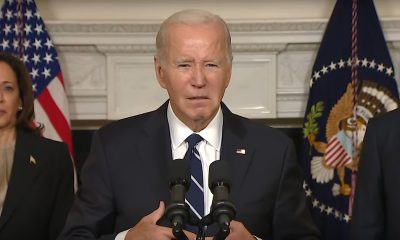National
Moderate senators back Pentagon’s ‘Don’t Ask’ review

Several moderate senators favor plans by Defense Secretary Robert Gates to study how best to implement repeal of ‘Don’t Ask, Don’t Tell.’ (DC Agenda photo by Michael Key)
Some moderate members of the Senate Armed Services Committee are getting behind the Pentagon’s review of “Don’t Ask, Don’t Tell” without explicitly expressing support for repeal.
DC Agenda asked several senators of the committee for their thoughts on last week’s hearing on the law prohibiting gays from serving openly in the U.S. military — and their positions on overturning it.
During the hearing, Defense Secretary Robert Gates unveiled plans for a Pentagon study that would examine implementation of repeal should Congress decide to overturn “Don’t Ask, Don’t Tell.”
Gates said he supports President Obama’s efforts at working to repeal the law and Chairman of the Joint Chiefs of Staff Adm. Michael Mullen said he personally believes gays should be allowed to serve openly in the U.S. military.
Sen. Mark Begich (D-Alaska) said, “the thing that stood out” during the hearing was how top military leaders “are looking at this issue.”
“Obviously, Mullen said that it needs to be changed, or at least moved through, so I thought that was a very interesting statement by military command,” Begich said. “That’s what I’ll be looking to, to see what their policy would be and what they intend to do.”
Asked about his position on “Don’t Ask, Don’t Tell,” Begich said he’s waiting for the Senate hearings to finish and the Pentagon to complete its investigation.
“I think having the military step up to the plate and acknowledging that it’s a policy of the past and that they are now moving forward and recommending — or potentially looking at it is probably a good move,” Begich said. “But I’m leaving it to the military to help us guide us through.”
Also expressing support for the review was Sen. Susan Collins (R-Maine), who said the law needs to be re-examined in light of the changes that have occurred since “Don’t Ask, Don’t Tell” was implemented in 1993.
“I support the review that the administration has underway in the Department of Defense,” she said. “I think ‘Don’t Ask, Don’t Tell’ does need to be reconsidered in light of all the changes of the last 17 years, and I was impressed with the testimony from Adm. Mullen.”
Collins recalled that Mullen said during the hearing that other NATO countries that have lifted similar bans had encountered no problems related to combat readiness or unit cohesion.
“That was useful information to get on the record, and we’ll see where we go from here,” Collins said.
Asked whether she would support legislation at this time that would repeal “Don’t Ask, Don’t Tell,” Collins said, “That’s not what is before us.”
“Right now, what’s before us now is to authorize the department to do a study of what the issues would be of changing the policy, and I support that, and that’s what the president has proposed, so we need to see,” she said. “I obviously think that the review is needed and that the policy needs to be reconsidered.”
Sen. Jim Webb (D-Va.) said Mullen and Gates “came forward with a very reasoned approach” to the ban on open service.
“They were careful in terms of how they laid it out and I think it’s absolutely the right way to go,” Webb said.
Asked whether he was ready to support repeal, Webb said, “I think everybody needs to let the process work, which is the commitment that Secretary Gates and Adm. Mullen made.”
Webb said he’s planning to be engaged in the updated analysis from the RAND Corp. on gays serving in the military, which Gates ordered as part of the Pentagon review. The senator added that, “it’s very important” as part of the review “to listen to the active duty military and to evaluate what they’re saying.”
While not expressing commitment for outright repeal, both Collins and Begich were more inclined to support a moratorium on “Don’t Ask, Don’t Tell” if it came before them.
Senate Armed Services Committee Chair Carl Levin (D-Mich.) told reporters following the hearing that he was considering a moratorium as legislative action on the issue this year, although he said he’s not ruling out any option.
Collins said she’d “have to see what specific recommendations the administration makes, the Pentagon makes,” but added, “putting on some sort of moratorium on cases where, for example, a third party reports — it might well make sense.”
Asked whether he would support a moratorium, Begich said, “I think, especially if they’re reviewing it, they should not take any negative actions against individuals until they review this policy and what they’re going to do and how to implement it.”
Webb reiterated his support for the Pentagon review of “Don’t Ask, Don’t Tell” when asked if he would favor a moratorium at this time.
“My personal belief is that people over here [in Congress] need to take the lead of the Department of Defense on this,” Webb said. “They’ve been very careful in terms of laying the way they should be analyzing it.”
One senator who wouldn’t offer his thoughts on “Don’t Ask, Don’t Tell” when questioned by DC Agenda was Sen. Ben Nelson (D-Neb.).
Asked whether he could answer questions on the issue, Nelson declined and said he had to make it to another engagement, adding, “I don’t have anything to say on it anyway; we haven’t had our hearings.”
District of Columbia
Fire by arson forced temporary shutdown of Glorious Health Club
Spa and art gallery catering to gay
men expects to reopen in August

In a little noticed development, D.C.’s Glorious Health Club, which bills itself as a spa, art gallery, and community center catering to gay men, was forced to close on May 19 after one or more unidentified suspects ignited a fire inside the club that D.C. fire department officials have ruled an act of arson.
Robert Siegel, the club’s owner, told the Washington Blade that he and investigators with the D.C. Fire and Emergency Medical Services Department believe one or more yet unidentified suspects broke into the kitchen of the former warehouse building where the club is located at 2120 West Virginia Ave., N.E.
According to Siegel, investigators with the fire department’s arson squad believe a flammable liquid was used to start the fire in the kitchen and in two other locations within the building.
“Three separate fires were started,” Siegel said. “They started one on a staircase and one on the upstairs storage area,” he said in addition to the one in the kitchen. He said about 40 patrons were in the club at the time the fire started, and all were able to leave without injury.
Siegel said the fire caused $500,000 worth of damage to his building, with some of the damage caused — understandably he said — by fire fighters who had to rip open doors and break through the roof to gain access to the flames that engulfed parts of the interior of the building. He said he arranged for repair work to begin after the fire was extinguished.
“I expect we’ll be reopening in about a month from now,” he said. “And we’ll be a bigger and better place.”
Fortunately, Siegel said, most of the artwork and art exhibits located in the club were not damaged.
“It was basically the kitchen, patio, and the roof,” he said, adding that much of the solar panels he had on the roof were destroyed by the fire or by firefighters seeking to gain access to the building.
“And the fire was so hot it did structural damage to the roof,” he said. “It actually melted steel. We’re talking about 50-foot steel beams that have to be replaced,” he told the Blade. “That’s $100,000 right there.”
Vito Maggiolo, a spokesperson for the D.C. Fire and Emergency Medical Services Department, said the fire was “ruled incendiary/arson” and is “under active investigation.”
It could not immediately be determined if one or more people responsible for the fire targeted the Glorious Health Club because it’s a gay community establishment.
National
House Republicans propose steep cuts in federal AIDS budget
Advocacy groups say move would eliminate ‘Ending HIV Epidemic’ initiative

The Republican-controlled U.S. House Subcommittee on Labor, Health, and Human Services, Education, and Related Agencies approved a spending bill on June 26 that calls for cutting at least $419 million from federal AIDS programs that AIDS activists say would have a devastating impact on efforts to greatly reduce the number of new HIV infections by 2030.
The subcommittee’s proposed bill, which includes billions of dollars in cuts in a wide range of other federal health, education, and human services related programs, is scheduled to be considered by the full House Appropriations Committee on July 10. Officials with AIDS advocacy groups say they are hopeful that the full committee, like last year, will refuse to approve the proposed cuts in the AIDS budget.
The proposed GOP cuts would eliminate $214 million from the U.S. Centers for Disease Control and Prevention’s HIV prevention programs, $190 million from the Ryan White HIV/AIDS Program, and $15 million from the Department of Health and Human Services Secretary’s Minority HIV/AIDS Program.
Activists say the impact of those cuts would kill the federal government’s Ending the HIV Epidemic initiative, which among other things, calls for reducing the number of new HIV infections in the U.S. by 75 percent by 2025 and by 90 percent by 2030. The activists point out that ironically the Ending the HIV Epidemic initiative was launched during the administration of President Donald Trump.
“Instead of providing new investments in ending HIV by increasing funding for testing, prevention programs, such as PrEP, and life-saving care and treatment, House Republicans are again choosing to go through a worthless exercise of cutting programs that the American people depend on and will never pass,” said Carl Schmid, executive director of the HIV + Hepatitis Policy Institute.
“While we vigorously fight these cuts, we look forward to working with the entire Congress in a bipartisan fashion on spending bills that can actually become law,” Schmid said in a statement.
Schmid noted that the bill also includes provisions known as “policy riders” that would take away rights and protections from women, such as access to birth control and abortion, and for minorities, including LGBTQ people.
According to a statement released by the office of Rep. Rosa DeLauro (D-Conn.), who is the ranking minority member of the House Appropriations Committee, one of the policy riders would “block the Biden administration’s policies to ensure nondiscrimination on the basis of gender identity and sexual orientation.’ The statement says another policy rider would “prevent policies or programs intended to promote diversity, equality, or inclusion.”
Most political observers believe the Democratic-controlled U.S. Senate would also kill the GOP proposed policy riders and cuts in the AIDS budget if the full Republican-controlled House were to approve the budget bill passed by the appropriations subcommittee.
Rep, Tom Cole (R-Okla.), who serves as chair of the full House Appropriations Committee, released a statement on June 27 defending the subcommittee’s bill and its proposed spending cuts. “The bill provides appropriate and fiscally responsible funding to ensure these departments can continue to perform their core missions while also acknowledging the fiscal realities facing our nation,” he said.
“Importantly, the bill pushes back on the Biden administration’s out-of-touch progressive policy agenda, preventing this White House from finalizing or implementing controversial rules or executive orders,” Cole said in his statement. “It also preserves long standing bipartisan policy provisions protecting the right to life.”
U.S. Supreme Court
Concern over marriage equality in US grows two decades after first Mass. same-sex weddings
Gay and lesbian couples began to marry in Bay State in 2004

Two decades after Massachusetts became the first state to legalize same-sex marriage, a new study reveals both significant progress and ongoing challenges for married LGBTQ couples in the U.S., with a growing sense of insecurity about the future of their rights.
The Williams Institute at UCLA School of Law surveyed 484 married same-sex couples from all 50 states and D.C. The study, released Monday, marks the 20th anniversary of legal same-sex marriage in the U.S.
Researchers found that 93 percent of respondents cited love as a primary reason for marrying, with 75 percent also mentioning legal protections. Over 83 percent reported positive changes in their sense of security, and 74.6 percent noted improved life satisfaction since marrying.
However, the study also highlighted persistent discrimination and growing concerns about the future. About 11 percent of couples who had a wedding reported facing prejudice during the planning process.
Alarmingly, nearly 80 percent of respondents expressed concern about the potential overturning of the 2015 Obergefell v. Hodges decision, which legalized same-sex marriage nationwide. This anxiety has been exacerbated by initiatives like Project 2025, a conservative policy blueprint that some fear could roll back LGBTQ rights if implemented.
The possibility of a former President Donald Trump victory in the upcoming election has further intensified these concerns. Many respondents cited Trump’s previous U.S. Supreme Court appointments and his statements on LGBTQ issues as reasons for their apprehension. One participant stated, “The thought of another Trump presidency keeps me up at night. We’ve come so far, but it feels like our rights could be stripped away at any moment.”
The current political climate has 29 percent of respondents considering moving to another state, with 52.9 percent citing socio-political concerns as a primary reason. This reflects a growing sense of insecurity among LGBTQ couples about their rights and freedoms.
Brad Sears, founding executive director of the Williams Institute, noted, “The data clearly show that marriage equality has had a profound positive impact on same-sex couples and their families. However, it also reveals ongoing challenges and serious concerns about the future of these rights in light of current political trends and the upcoming election.”
Christy Mallory, legal director at the Williams Institute and lead author of the study, added, “This research provides crucial insights into the lived experiences of same-sex couples two decades after marriage equality began in the U.S. The high level of concern about potential loss of rights underscores the continued importance of legal protections and public support for LGBTQ+ equality.”
The study found that 30 percent of surveyed couples have children, with 58.1 percent of those parents reporting that marriage provided more stability for their families. However, many of these families now worry about the security of their legal status in the face of potential policy changes and shifting political landscapes.
As the nation reflects on two decades of marriage equality, the study underscores both the transformative power of legal recognition and the ongoing need for vigilance in protecting LGBTQ+ rights. The findings highlight the complex reality faced by same-sex couples in America today: Celebrating hard-won progress while grappling with uncertainty about the future, particularly in light of upcoming political events and potential shifts in leadership.
-

 Canada2 days ago
Canada2 days agoToronto Pride parade cancelled after pro-Palestinian protesters disrupt it
-

 Baltimore4 days ago
Baltimore4 days agoDespite record crowds, Baltimore Pride’s LGBTQ critics say organizers dropped the ball
-

 Sports4 days ago
Sports4 days agoHaters troll official Olympics Instagram for celebrating gay athlete and boyfriend
-

 Congress5 days ago
Congress5 days agoMembers of Congress introduce resolution to condemn Uganda’s Anti-Homosexuality Act











